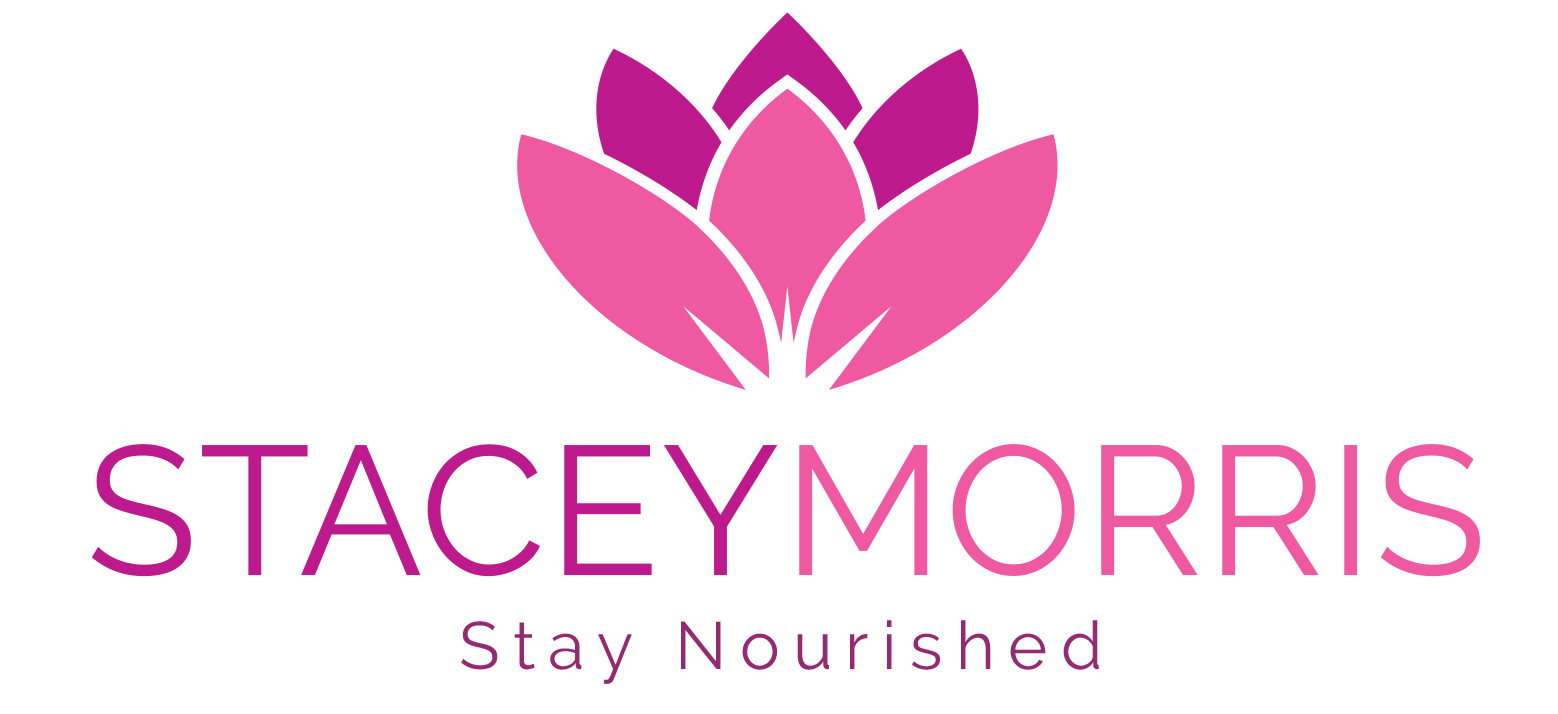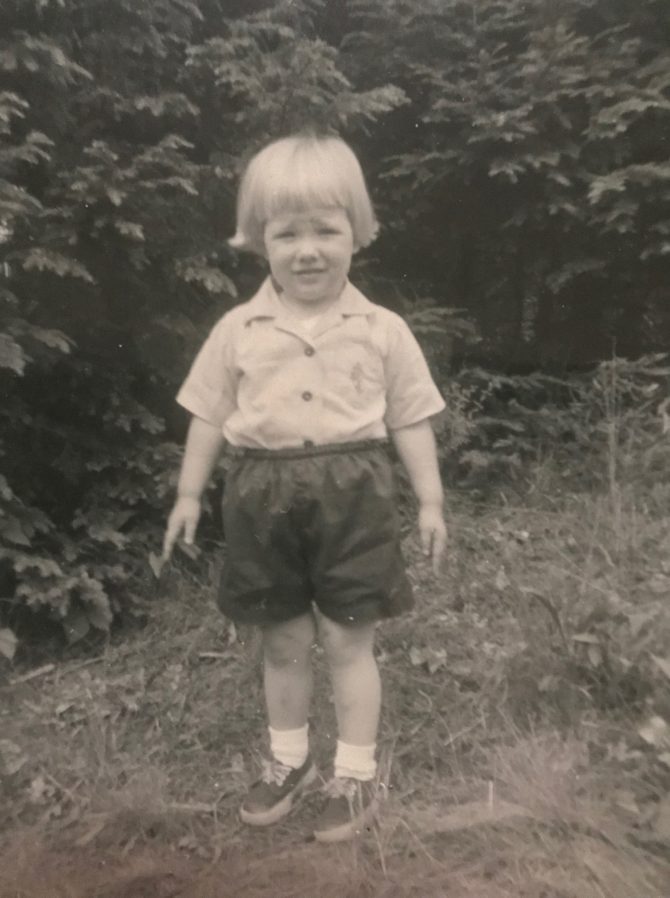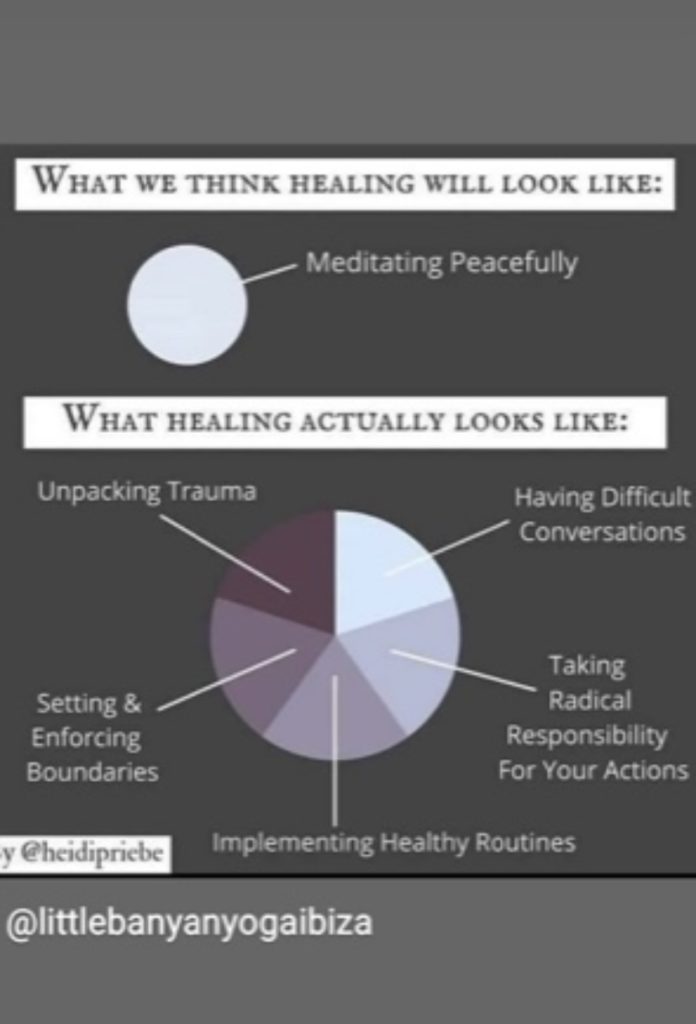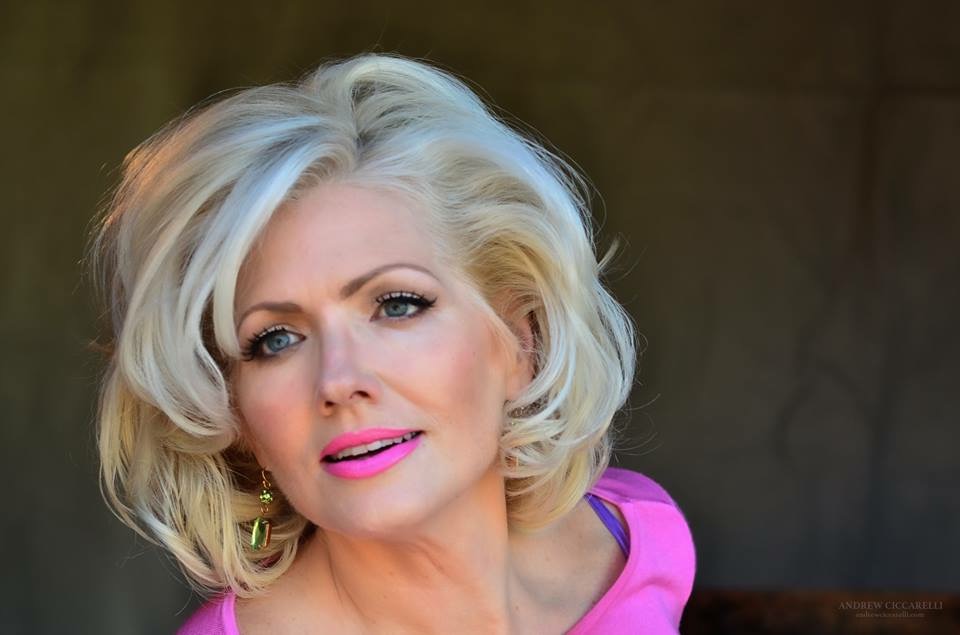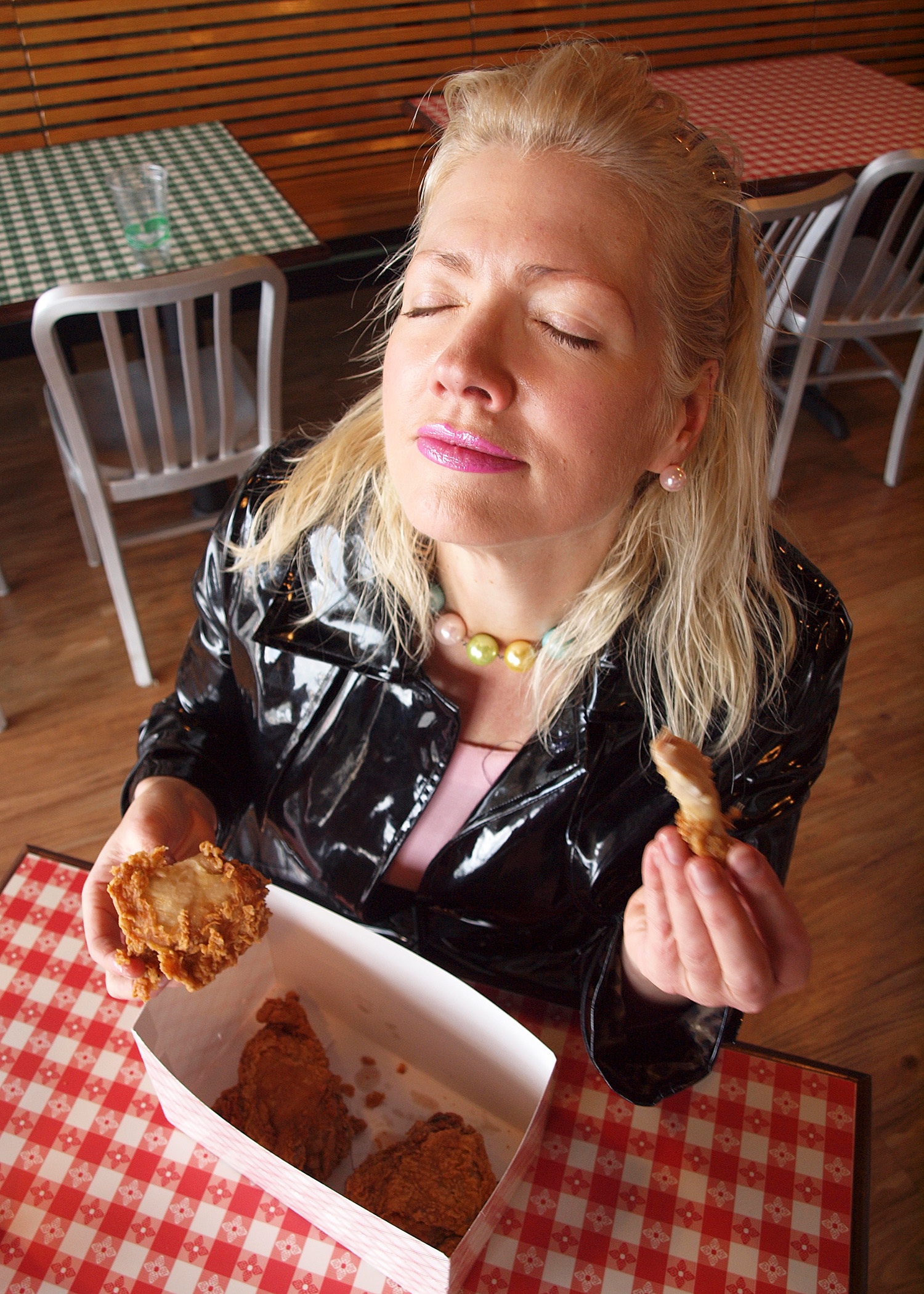1978
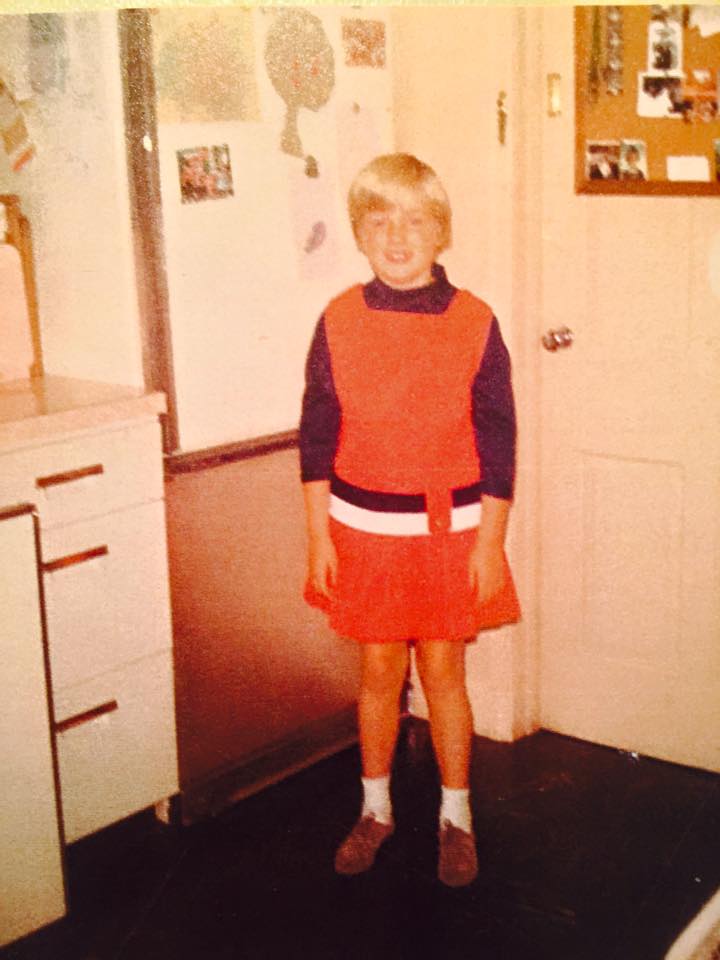
Healing requires more than journaling, talking to a therapist, changing up food choices, hopping on a stationary bike, and starting the day with meditation. All of these things have value but they’re not enough if there are unresolved issues of a traumatic nature. Trauma embeds into the body as a self-protective move when there’s too much for the mind to handle. That’s especially true when we’re young and trying to get a foothold on where we fit in in the world. The sing-songy notion that today’s a new day and the past is over isn’t quite true if you’re carrying wounds. Mine reared their heads in the form of auto-immune disease and chronic foot pain two years ago. I never experienced anything like it – even at my highest weight. My gut told me there was an emotional corollary (there always is) and after agreeing to take some quiet, deep dives into my body and simply listen, the shifting that was waiting to occur finally did. We are composite pieces of the past operating in the now and creating our future. And that’s why I’m sharing this with you:
I sat next to my mother in the passenger seat of her car about a month ago, a heavy pit in my stomach. We’d just pulled into our favorite park, but before we exited the car, I needed to tell my mother how hard it was for me to be alive in 1978. I was in eighth grade and my world, which wasn’t rosy to begin with, had reached crescendo levels of unbearability.
- We moved to a new school district. For a shy kid steeped in low self-esteem because of my weight, I did anything but flourish.
- Adding to the isolation was being dropped by my best friend from childhood, who had also moved to the same school district but deemed me a social liability in her determination to ascend the ranks of the popular-girl pyramid.
- My dog was hit by a car and killed in front of my eyes one evening when I took her out for a walk.
- And underneath the intermittent emotional bombs, my family was in turmoil because my father’s business went belly-up that year. And not because it was the bank’s fault or the lawyers’ fault or the fault of anyone else on his ‘to blame’ list. The business, begun proudly by his father, crashed and burned because of my dad’s grandiose wild spending and financial mismanagement. This left the family destitute and in debt and my father obsessed with vengeance against the bank that foreclosed on him.
Humiliated by losing all but unwilling to acknowledge his part in it, my father buried himself in a series of lawsuits that never went anywhere. He’d call us into his office to proclaim how we’d all be rich one day and the bank would finally get their come-uppance. If it isn’t already apparent, my father was a narcissist. Textbook. No one‘s needs mattered more than his own, even his children’s. If I earned money at a summer babysitting job he demanded I turn it over, reminding me that I ‘cost him a lot of money.’ If I wanted to go to the mall with friends on a Friday night like every other 13-year-old, I was screamed at for asking for $5 so I could buy a soda and a slice of pizza. One night he responded by bitterly tossing three singles across his desk and shaking his head in disgust.
My father’s shenanigans were known about town and he’d nailed down a reputation for being a huckster. Not long after my grandfather’s legacy demolished, a particularly hateful classmate sent me a typewritten anonymous letter with the newspaper clipping of my father‘s arrest for writing a bad check. ‘I see daddy try to buy something but couldn’t hack it financially…Ha-Ha! You loser.’
One day, he announced he was moving to Virginia because someone in Albany was preventing him from obtaining his license to sell life insurance – there was always a shady story and half-baked excuse with him. That was all the rationale he needed to leave for Alexandria. It wasn’t a divorce, just a temporary diversion for him to forget he was married and had familial responsibilities. This left my mother, already emotionally fried from a year of financial tail-spinning, in a state that alternated between seething anger and depression. She would sometimes lock herself in her bedroom for the night and refuse to answer our knocks on the door. As the oldest of four, I was first in line for bearing responsibility for the other three, but also completely inept emotionally to be the rock my younger siblings needed.
Whenever my father’s insane choices made the world around her a vortex of chaos, my mother stepped up her campaign of food scarcity and body shaming, hiding forbidden food from me in attic trunks, or amongst the cardboard bunkers of boxes in the basement. If I was ever caught relieving myself with any of her hidden stash it was Armageddon. We hated each other. We were each other‘s targets for the rage we felt at life not being like it was promised in the movies. By the time 1978 rolled around, our family decided to 86 the painful tradition of the Happy Family Christmas cards. Even my parents, mired in denial as they were, must have known the façade was futile.
I blotted out daily reality with as much food as I could get my thieving little hands-on, and lots of Led Zeppelin on the turntable up in my room. There was no one to talk to about the pain I was in. My sister and I shared a room so it was the bathroom where I was guaranteed privacy and a place to cry. And it was in that powdery blue bathroom surrounded by Dixie cups and half-empty hair mousse bottles that I thought about suicide for the first time. My psyche was macerated from a constant barrage of macro and micro-aggressions. I’d become accustomed to my parents’ disapproval, and being ridiculed at school, but was unprepared for lectures from my grandmother when she came for extended visits. Babysitters had always been told to keep food away from me and they were always quick to remind me how imperative it was that I change for the better.
School was a lonely and humiliating place where I’d brace myself every day to pretend I didn’t hear the names. In an effort to get me to say on my latest diet attempt, my parents explained to me that the name-calling I experienced at school, or at the mall, or while crossing a street – there was no safe place in those days for people not bestowed with thin privilege – was my fault. “No one can help their height or if their ears stick out, but you control your WEIGHT,” my father was fond of telling me, even though he never succeeded once at doing what he told me I should do. There are more anecdotes but this paints enough of a picture. By year’s end I was emotional wreckage personified and believed with every shred of my being that I was worthless and hateable. Call me self-indulgent for sharing these memories but that’s who I am – a catalyst – I show the underbelly because that’s where the evolution is. And I do it to let others know they’re not alone. 1978 was a terrible and bewildering time in my life and I look back in amazement that I got through it. Guardian angels are my only explanation. F%&K that ‘Sticks and Stones’ limerick. Emotional scars are not to be dismissed or underestimated. They are to be tended to with reverence. And if you won’t offer them the honor they deserve, who will?
By the time I was finished telling my mother what I needed to, the tears had started to dry and she had reached over to clutch my hand (something she hadn’t done since I was four). There was an immediate sense of relief and lightness in my body. I knew my gut was solidly correct: that taking an honest look at 1978 was the path forward. I’ve been getting flashbacks from 1978 for months now, and I finally put it together that the embedded trauma from that era has come home to roost, in the form of physical pain and autoimmune disease. And I consider myself very fortunate that it isn’t a more serious, terminal disease. So before it gets to that point, I’m engaging in a looooong overdue airing of my grievances.
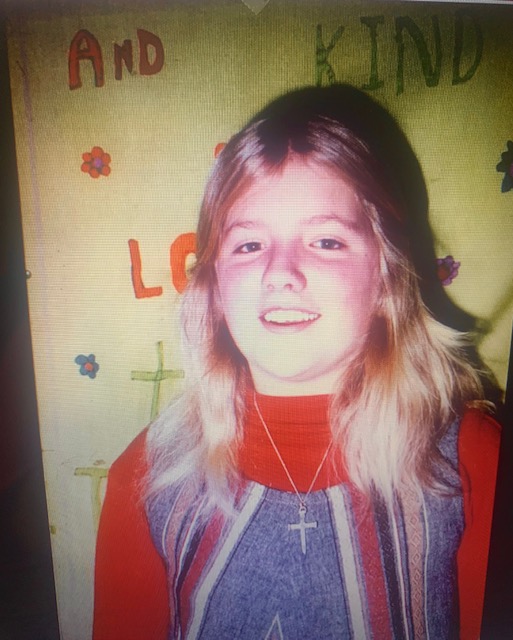
No one is more stunned over this setback than I because I thought I’d crossed the finish line when I dropped 180 pounds 11 years ago and kept it off for a decade. And as many of you know, it wasn’t just a weight loss achievement. I did the inner work for years. Through therapy, journaling, self-help books, overeaters anonymous meetings, and even a month-long stay in a food addiction rehab. I believed I’d left no emotional stone unturned, but the thing about 1978 was, the frequency of sorrow, fear, and buried rage proved to be an invisible poison. With no recourse to help myself, and with no emotional support from anyone I knew intimately or peripherally, my unconscious mind performed its due diligence by hiding it from my sight. This is a protective and self-preserving method we’re all equipped in and sometimes it’s simply enough for the horrible stuff to remain buried. But everyone is different, and my subconscious was sending out distress signals:
Episodes from 1978 would be my first thought in the morning, and I’d be back on that darkened road where my dog lay motionless on the pavement, with her eyes wide open as passing cars splashed through puddles of her blood. Or my childhood friend, at a time when I desperately needed to belong, shooting me a ‘don’t come over here’ warning look when I’d be frantically looking for someone to talk to at recess. And my mother summoning me to the refrigerator to berate me for the theft of a piece of cheese (she kept track of the slices) telling me how I had no right to eat anything in between meals. Memories were bubbling to the surface and they weren’t random. The pattern was a trail of crumbs leading to a massive pile of emotional garbage that had been rotting within me.
I partook of the usual remedies of crying, feeling, and journaling but this time, the wounds were demanding verbal expression. Part of my healing from the hell that was 1978 is to not just acknowledge my pain to myself, but also to those who have hurt me. My father is gone and I’ve been doing the mental dialogue of what I would like to say now if here were here as best I can. But my mother is here and I knew I would be doing myself a huge disservice if I swept it under the rug. I laid out my side of the story with compassion, but I was honest. She sat and listened to me, and that’s all I wanted from that encounter with my mother – to be heard.
Difficult conversations are usually avoided. The avoidance may be easier in the moment, but the ensuing price is high. The one with my mother was successful because she listened. But I’ve had difficult conversations with people who cannot hear anything that veers from their script of reality and it usually gets ugly. And I’ve realized that the reaction of the other isn’t the point…it’s having the courage to speak aloud about uncomfortable subjects and advocate on my own behalf. There are more conversations I need to have with others and I’m scared. That’s the truth. Maybe someday it’ll be easy, or perhaps second nature. I’m not there yet. And that’s not going to stop me. Wounds have the right to be aired. And if the past is unmistakably seeking you out, it may be time to enter the discomfort zone and let the healing begin.
